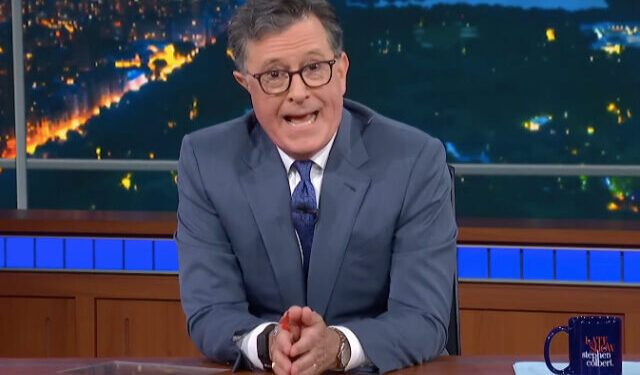On Wednesday night, Stephen Colbert used his late-night platform to once again push for more gun control, this time focusing on so-called “long guns.” The comments came during an interview with Sen. Chris Murphy (D-CT), one of the most vocal advocates for restricting Second Amendment rights.
Colbert opened the discussion by immediately framing the news of the day through the lens of gun control. As he said at the start of the segment, “Before we get into anything else, right off the top, I just want to point out and let everybody know that you have been a tireless advocate for gun control for years now. And as you know, and I think most of the people out here know, today there was another tragic shooting, this time at an ICE facility down in Dallas. We don’t know a lot about it so far. What goes through your mind when you hear about another shooting like this?”
Murphy’s response struck a familiar partisan note: “It just sickens me that we have a president who instead of trying to stand up and say wherever the violence comes from, it’s unacceptable, is politicizing this moment. It’s about the victims and it’s about a mourning of a loss of a potential moment to bring this country together.”
From there, Colbert quickly shifted the focus toward broader restrictions. “I mean, there really hasn’t been much movement to rein in the access to the long guns and many of the weapons used in these killings, but, I mean, hopefully, maybe there could be a political sea change in the United States.”
The irony is hard to miss. The weapon used in the Dallas attack wasn’t a modern, high-capacity firearm. Reports indicate it was a bolt-action rifle chambered in 8mm, a design that dates back to World War II. Such rifles are mechanically rudimentary by today’s standards. After each shot, the shooter must manually lift the bolt, pull it back to eject the spent shell, then push it forward to chamber a new round before locking it down to fire again. These are tools of a bygone era, often collected as antiques or used by sportsmen for target practice and hunting.
Yet Colbert’s framing lumped this decades-old rifle into the same category as modern semi-automatic firearms, suggesting there should be additional federal restrictions on access to “long guns” as a whole. This type of broad-brush approach is exactly what concerns millions of law-abiding gun owners. Instead of focusing narrowly on the individual who committed the crime, the reflexive call is for Washington to regulate entire categories of firearms—regardless of their practicality, history, or legitimate use.
It’s a familiar pattern: each incident becomes an opportunity to promote sweeping restrictions, even when the facts don’t support the case. A WWII-era bolt-action rifle is hardly a symbol of modern gun violence, yet it was used as a prop to argue for tighter laws. That raises an important question: if calls for gun control are now being extended to century-old hunting rifles, where does the push end?
This moment also illustrates a deeper divide in how America approaches crime and violence. On one side, there’s a push to expand bureaucratic oversight and restrict individual freedoms in the name of “safety.” On the other, there’s a call for common-sense accountability—holding criminals responsible for their actions without punishing the millions of responsible citizens who exercise their constitutional rights.
Gun control advocates often argue that more restrictions equal more safety. But history shows otherwise. Communities that respect the right of law-abiding citizens to defend themselves consistently demonstrate that freedom and security are not mutually exclusive. When high-profile voices like Colbert blur the line between antique firearms and modern weapons, it reveals just how expansive the agenda truly is: not simply about reducing crime, but about redefining the relationship between citizens and their rights.
The Dallas attack was tragic, as all acts of violence are. But rather than being a reasoned case for gun control, it underscores the reality that evil finds a way regardless of the tool. The instinct to reach for more federal control, especially over rifles that require deliberate, slow operation, should make Americans ask: is this really about safety—or about steadily narrowing the scope of individual liberty?





















Hey murph – have you ever come up with even a remotely viable plan to ‘confiscate’ lawfully owned private property that is protected by the Constitution (2nd Amendment) from well over 100 MILLION legal gun owners. Never mind that such an action would also likely be an improper deprivation of said private property under the 5th Amendment.
BTW such an action would also be a graphic example of ‘corporate punishment’ which is anathema to our form of government – punishing people for something they didn’t do is just wrong. Period.